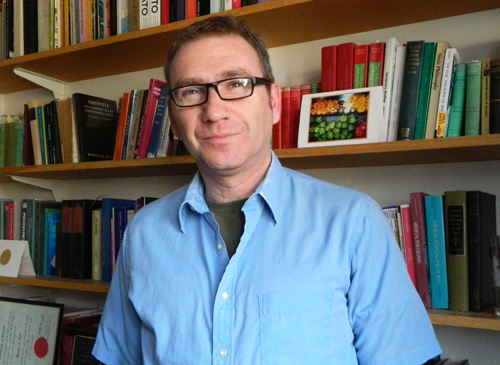
What makes life meaningful? Philosophy professor John Russon has been examining that question for the past 15 years from various perspectives. Two of his books (Human Experience: Philosophy, Neurosis and the Elements of Everyday Life and Bearing Witness to Epiphany: Persons, Things and the Nature of Erotic Life) explore the process by which people grow up and form personal identities. In researching and writing them, Russon has come to some conclusions about what things are truly valuable.
Now he’s taking what he’s learned and comparing it to the values of our current economic system. “Economics shapes our everyday lives,” he says, “but the notion of value in the economic domain doesn’t come close to defining what is really valuable in life: things like love, family, career.”
What does the economic system value? Profit. Russon acknowledges that the economic set-up we have is essential in our society. “We need banks, we need money, we need to participate in the marketplace,” Russon says. “However, although economics is important, it must be subordinate. It can’t be in charge. When the marketplace sets the terms for our lives, we’re in trouble.”
Part of Russon’s evidence for this is that there are things in our lives we can’t put a price on – they are so important to us as individuals or as a society that we depend on them absolutely. “But economics acts as though everything has a price,” he says.
Russon uses the current environmental problems as an example of how this works. To survive, we need a healthy natural environment, but we are currently facing a crisis situation due to the damage done to our air and water and climate change. Economics doesn’t look at that big picture, only at how to make a profit from the natural resources now. “Everything is up for sale,” comments Russon. “We must not allow the things we need to be healthy people – physically and psychologically – to be sold off in the name of profit.”
The difference between what the economic system values and what people value is the reason for Russon’s contention that we need more regulation of the economic system. “The capitalist system has produced amazing growth and development, and for a long time it was easier to notice the advancements and not be concerned about the problems. Now it’s getting harder not to see the exploitation and destruction.”
Recent years, for example, have given us government bail-outs of banks and major industries, the mortgage crisis in the U.S. and economic collapse in some European countries. He says the trend toward deregulation, which has been going on for several years in the U.S., will likely lead to more problems for people.
“These regulations are necessary to balance the real needs of people against the drive for profit,” he says. “People need certain kinds of living conditions, so you have to have laws in place to regulate how many hours people can be made to work, and the working conditions they can expect. Companies feel they can make more money if they pay people less, so you need laws to set a minimum wage.”
In North America, Russon feels that governments have been going in the wrong direction, letting economics control their decision-making rather than the other way around. “The economic powers are huge and they are not friendly. Many people do protest against economic policies, but it is hard to have an effect because of the power and forcefulness of the groups fighting for less regulation.”
In fact, he feels that economics and politics have become too closely linked.
If politicians can’t be counted on to step up to the plate on these issues, Russon sees a greater weight of responsibility falling on educators. “Scholars and teachers need to educate people about these issues, but that’s challenging, too, because education funding is disappearing. Policies to protect education are as important as policies to protect the environment, because this is how people learn about the issues.”